The Berlin Wall - die Berliner Mauer
-
... and the famous border crossing "Checkpoint Charlie"
...
In this item we are looking back at a piece of German history during
the second half of the twentieth century.
The rigorous use of data and information - even with mostly "manual"
processing tasks involved at that time - has led to an exploitation of
people never seen before, also spying at each other at the workplace, in
the family and among friends (and all this initiated by the government).
Many have written off Orwells vision or are not even aware about it
- but it is time to read his book "1984" again !
About
George Orwell ...
If we are not very careful - then "1984" can become reality within some
years time.
There is certainly a lot information available on the Internet regarding
the Berlin Wall (1961- 1989). We thought we bring you some pictures (mostly
downloaded from freely available sources on the net) with only some words
attached and let the photos speak for themselves. The images we selected
reflect the feelings of the author who has experienced these developments
first hand from childhood on (he also has family and friends in Berlin).
"When I was six years of age I walked freely
with my parents through the Brandenburg Gate ... and my father showed me
with pride where he grew up in former East Berlin. I also met extended
family with children in my age which I should never see again - because:
there
was the 13th of August 1961 when they built the wall."
In 1961 there is disbelief in the Western part of the city when they
start to build the fortifications on the Eastern side. American soldiers,
TV and radio crews, ordinary people are watching powerless ...

People in the street can't belief their eyes what is happening in the
middle of the road in front of their homes .... they
(the East German Government together with Russian support) are building
a wall to separate them from neighbours, families, friends, the pub and
the grocery store on the other side of the road.

All of the sudden the access to the underground train stations is no
longer possible becauce it is in the Eastern sector - see the big U-Sign
marking the entrance to the underground railway station.
There is the personal experience of the author while travelling with
the "U-Bahn" (subway) from "West to West" through - or better "below" -
areas which belonged to the Eastern part of the city ... NO
stops but soldiers from Russia and the former GDR everywhere in otherwise
deserted "ghost" railway stations ...

Trams (light railways) have to stop at "Potsdamer Platz" -
there is no connection anymore between West and East ....
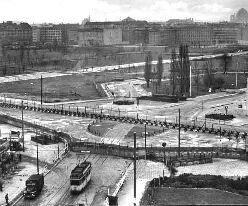
The mood these people are in can be felt ...
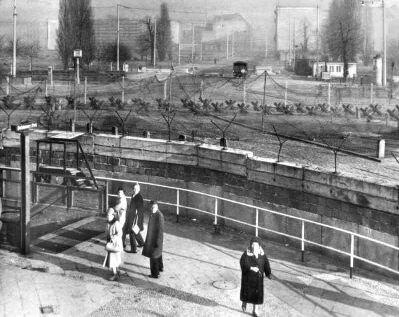
One of the first walls in front of the Brandenburg Gate
...
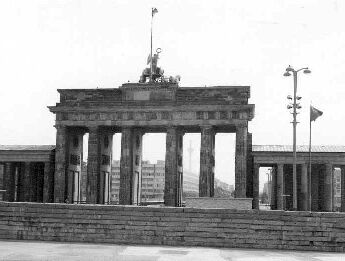
Some years later strengthend fortifications were erected at the Brandenburg
Gate ...

There is NO way anymore that you can have a chat with your neighbours
on the other side of the street (most of them have also been forcefully
removed from their homes).

The same street corner with a pizzeria - would you enjoy the meal knowing
that people are getting killed just 5 metres away from you because they
want to join you at the pub ...

Going "shopping" alongside the wall or pick up the paper in the morning
from your dairy ...

Many people were living in apartment blocks close to the wall
...

The small elevation on the left in the death strip is the entrance to
Hitlers bunker (from WW II) ...
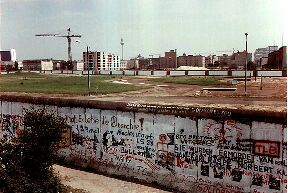
West and East ... the cleared area is spicked with
landmines - there is absolutely NO possibility to cross the death strip
!
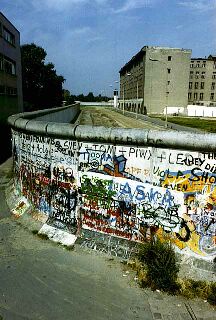
Another view of the same area ... the kids played here with
friends from the apartment blocks on the right !

"Checkpoint Charlie" in the sixties
- one of a handful of border crossings between West and East ..
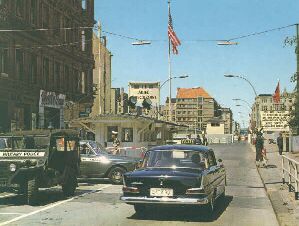
Another view at "Checkpoint Charlie" in the eighties (the wall is in
the middle of the background) ...

Probably some of the most dramatic times in Berlins history were happening
at "Checkpoint Charlie" - minutes decided about another "World War" when
Russian and American tanks and soldiers where put in position and directed
against each other in the middle of the divided city. All this was happening
at "Checkpoint Charlie" under the eyes of the population.
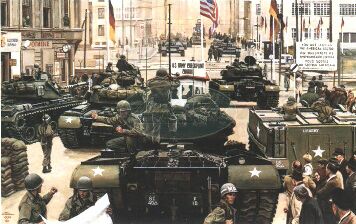
More than twenty years later in history - only the world famous display
at "Check Point Charlie" reminds us of the times which made history in
this town.
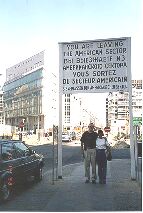
A city has come to a rest for a while after making world history - but
it is facing new challenges .... and not only at
"Checkpoint Charlie"

... to learn more about the Berlin of today - please visit the following
web site: http://www.berlin.de/
About George Orwell ...

GEORGE ORWELL WAS THE PEN NAME of the English author, Eric Arthur Blair.
Orwell was educated in England at Eton College. After service with the
Indian Imperial Police in Burma from 1922 to 1927, he returned to Europe
to become a writer. He lived for several years in poverty.
His earliest experiences resulted in the book, Down and Out in Paris and
London.
By 1936, Orwell had joined the Republican forces in the Spanish Civil
War. Orwell was critical of Communism but basically considered himself
a Socialist. He was wounded in the fighting. Late in the war, Orwell fought
the Communists and eventually had to flee Spain for his life. Orwell
documented many of his experiences during the Spanish Civil War in his
Homage to Catalonia.
Orwell's various experiences with totalitarian political regimes had
a direct impact on his prose. Orwell's best-known books reflect his opposition
to totalitarianism: Animal Farm and Nineteen Eighty-Four. In an article
entitled, "Why I Write" Orwell would explain:
"Every line of serious work that I have written since 1936
has been written, directly or indirectly, against
totalitarianism...Animal Farm was the first book in which
I tried, with full consciousness of what I was doing, to
fuse political purpose and artistic purpose into one
whole."
During the Second World War, Orwell wrote a weekly radio political commentary,
designed to counter German and Japanese propaganda in India. His wartime
work for the BBC gave him a solid taste of bureaucratic hypocrisy. Many
believe that this experience provided the inspiration for his
invention of "newspeak," the truth-denying language of Big Brother's
rule in his novel Nineteen Eighty-Four.
Throughout his lifetime, the great English author continually questioned
all "official" or "accepted" versions of history. At the conclusion of
the war in Europe, Orwell expressed doubt about the Allied account of events
and posed the following question in his book Notes on Nationalism, "If
liberty means anything at all, it means the right to tell people what they
do not want to hear... Is it true about the gas ovens in Poland?"
Of all of Orwell's writings,1984 has had the most profound influence
on historical revisionism. Revisionist pioneer, Harry Elmer Barnes wrote
an important essay, "How 'Nineteen Eighty-Four' Trends Threaten American
Peace, Freedom, and Prosperity," which documented the prophetic nature
of Orwell's classic. Barnes would proclaim,
"Orwell's book is the keenest and most penetrating work
produced in this generation on the current trends in
national policy and world affairs. To discuss world
trends today without reference to the Orwell frame of
reference is not unlike writing on biology without
reference to Darwin, Mendel, and De Vries..."
Orwell died in London at the early age of forty-seven of a neglected
lung ailment. He left behind a substantial body of work and a reputation
for greatness.
Biographical Information
Date of Birth- June 25,1903
Place of Birth- Motihari, India
Died - January 21, 1950
Partial Bibliography
Down and Out in Paris and London (1933)
Burmese Days (1934)
A Clergyman's Daughter (1935)
Keep the Aspidistra Flying (1936)
The Road to Wigan Pier (1937)
Homage to Catalonia (1938)
Coming up for Air (1939)
Inside the Whale, and Other Essays (1940)
Animal Farm (1945)
Nineteen Eighty-four (1949)
Shooting an Elephant and Other Essays
(1950)
Such, Such Were the Joys (1953)
